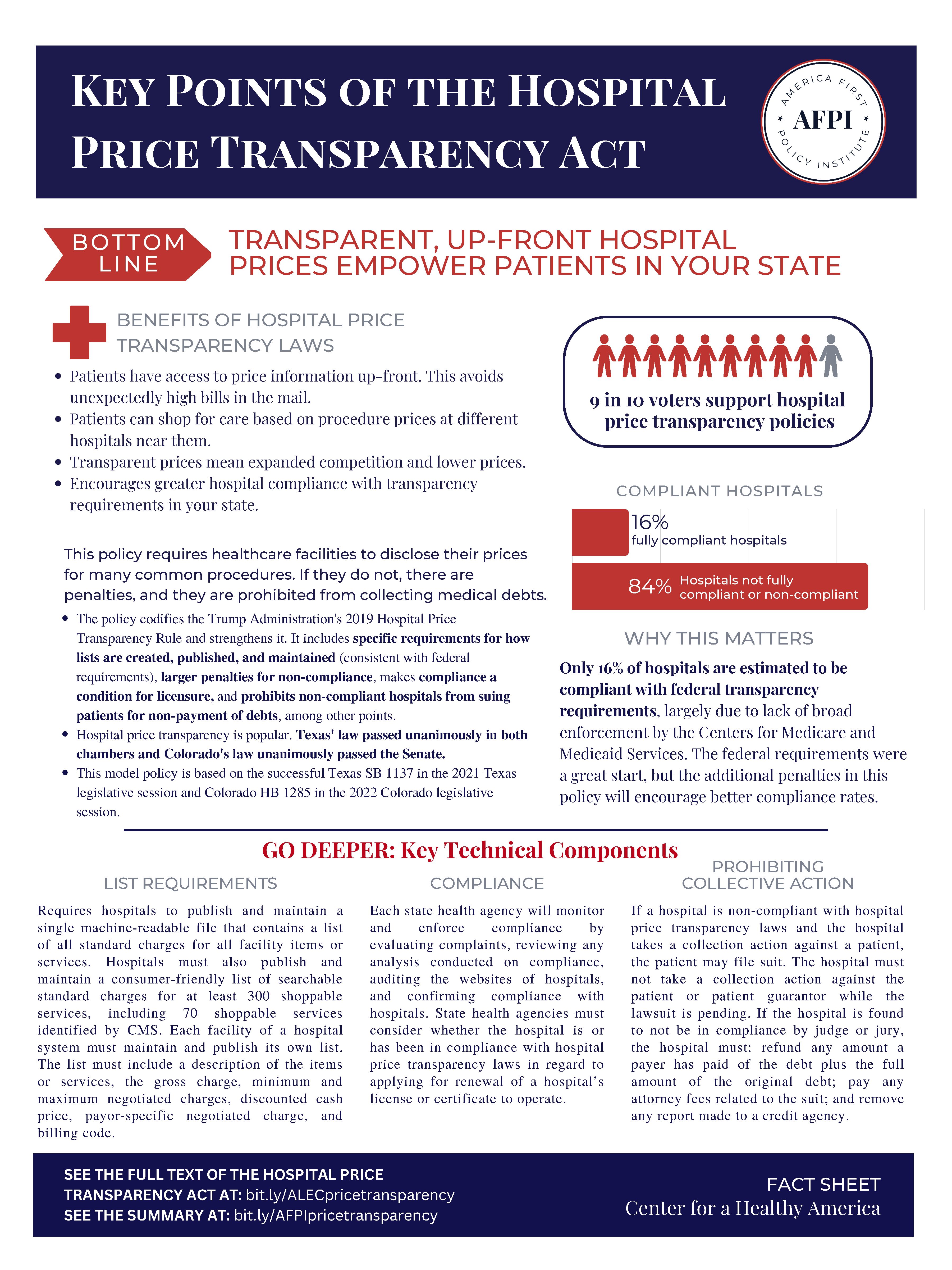Key Points of the Hospital Price Transparency Act
Key Takeaways
9 in 10 voters support hospital price transparency policies.
This policy requires healthcare facilities to disclose their prices for many common procedures. If they do not, there are penalties, and they are prohibited from collecting medical debts.This policy requires healthcare facilities to disclose their prices for many common procedures. If they do not, there are penalties, and they are prohibited from collecting medical debts.
Only 16% of hospitals are estimated to be compliant with federal transparency requirements,
BENEFITS OF HOSPITAL PRICE TRANSPARENCY LAWS
- Patients have access to price information up-front. This avoids unexpectedly high bills in the mail.
- Patients can shop for care based on procedure prices at different hospitals near them.
- Transparent prices mean expanded competition and lower prices.
- Encourages greater hospital compliance with transparency requirements in your state.
This policy requires healthcare facilities to disclose their prices for many common procedures. If they do not, there are penalties, and they are prohibited from collecting medical debts.
- The policy codifies the Trump Administration's 2019 Hospital Price Transparency Rule and strengthens it. It includes specific requirements for how lists are created, published, and maintained (consistent with federal requirements), larger penalties for non-compliance, makes compliance a condition for licensure, and prohibits non-compliant hospitals from suing patients for non-payment of debts, among other points.
- Hospital price transparency is popular. Texas' law passed unanimously in both chambers and Colorado's law unanimously passed the Senate.
- This model policy is based on the successful Texas SB 1137 in the 2021 Texas legislative session and Colorado HB 1285 in the 2022 Colorado legislative session.
WHY THIS MATTERS
Only 16% of hospitals are estimated to be compliant with federal transparency requirements, largely due to lack of broad enforcement by the Centers for Medicare and Medicaid Services. The federal requirements were a great start, but the additional penalties in this policy will encourage better compliance rates.
GO DEEPER: Key Technical Components
LIST REQUIREMENTS
Requires hospitals to publish and maintain a single machine-readable file that contains a list of all standard charges for all facility items or services. Hospitals must also publish and maintain a consumer-friendly list of searchable standard charges for at least 300 shoppable services, including 70 shoppable services identified by CMS. Each facility of a hospital system must maintain and publish its own list. The list must include a description of the items or services, the gross charge, minimum and maximum negotiated charges, discounted cash price, payor-specific negotiated charge, and billing code.
COMPLIANCE
Each state health agency will monitor and enforce compliance by evaluating complaints, reviewing any analysis conducted on compliance, auditing the websites of hospitals, and confirming compliance with hospitals. State health agencies must consider whether the hospital is or has been in compliance with hospital price transparency laws in regard to applying for renewal of a hospital’s license or certificate to operate.
PROHIBITING COLLECTIVE ACTION
If a hospital is non-compliant with hospital price transparency laws and the hospital takes a collection action against a patient, the patient may file suit. The hospital must not take a collection action against the patient or patient guarantor while the lawsuit is pending. If the hospital is found to not be in compliance by judge or jury, the hospital must: refund any amount a payer has paid of the debt plus the full amount of the original debt; pay any attorney fees related to the suit; and remove any report made to a credit agency.
